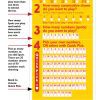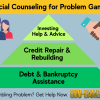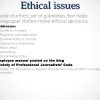Imagine this: you’re sitting at a poker table, the adrenaline pumping through your veins as you place your bets. The thrill of the game is contagious, and it’s easy to get caught up in the excitement. But what happens when the fun turns into something more? Can a gambling addiction be cured? Let’s dive into this topic and find out.
Gambling addiction is a serious issue that affects many individuals worldwide. It’s not just about losing money; it can lead to strained relationships, financial problems, and detrimental effects on mental health. So, can this addiction be overcome? Is there hope for a brighter future? Stick around as we explore the possibilities.
Seeking a solution for a gambling addiction can be a rocky road filled with challenges and setbacks. But don’t despair! With the right support, strategies, and determination, it’s possible to break free from the grip of gambling addiction. In this article, we’ll discuss the various treatment options, coping mechanisms, and success stories that provide hope for those in need. So, let’s jump right in and explore how to reclaim control and find the path to recovery.

Can a Gambling Addiction Be Cured?
Gambling addiction is a serious issue that affects millions of people worldwide. It can lead to financial ruin, strained relationships, and a host of other negative consequences. Many individuals wonder if there is a cure for gambling addiction, or if they will have to battle it for the rest of their lives. In this article, we will explore the various treatment options available and discuss the possibility of curing a gambling addiction.
The Road to Recovery: Seeking Help
Recognizing that there is a problem and seeking help is the first step towards overcoming a gambling addiction. There are several resources available for those looking to get on the path to recovery. One option is to attend support groups such as Gamblers Anonymous, where individuals can share their experiences and receive support from others who have faced similar challenges. Therapy, both individual and group, can also be beneficial in helping individuals address the underlying issues driving their addiction.
Another important aspect of seeking help for gambling addiction is finding a qualified professional. This can be a therapist specializing in addiction, a psychiatrist who can prescribe medication if necessary, or even a financial advisor who can help individuals regain control of their finances. It is important to find a professional who is experienced in treating gambling addiction and who can provide the necessary guidance and support throughout the recovery process.
Treatment Options: Therapy and Medication
Therapy plays a crucial role in the treatment of gambling addiction. Cognitive-behavioral therapy (CBT) is often used to help individuals identify and change the unhealthy thoughts and behaviors that contribute to their gambling problem. This type of therapy focuses on developing coping strategies and improving self-control. It can also address underlying issues such as depression or anxiety that may be fueling the addiction.
In some cases, medication may be prescribed to assist in the treatment of gambling addiction. Antidepressants, such as selective serotonin reuptake inhibitors (SSRIs), have been shown to be effective in reducing the urge to gamble. Other medications, such as mood stabilizers or anti-seizure medications, may be used if there are co-occurring mental health conditions.
It is important to note that medication alone is not a cure for gambling addiction. It is most effective when used in combination with therapy and other forms of treatment.
Self-Help Strategies for Overcoming Gambling Addiction
In addition to seeking professional help, there are several self-help strategies that individuals can employ to overcome a gambling addiction. These strategies can be used alongside therapy and medication to achieve long-term recovery.
One important self-help strategy is to develop a network of supportive individuals. This can be friends, family members, or even individuals from support groups who can provide encouragement and accountability. Having someone to talk to and lean on during difficult times can make a world of difference.
Another self-help strategy is to create barriers to gambling. This can include blocking gambling websites on your devices, avoiding places where gambling takes place, and giving control of your finances to a trusted individual.
Building healthy habits and finding alternative activities to occupy your time and thoughts is also crucial. Engaging in hobbies, exercise, and spending time with loved ones can help fill the void left by gambling.
The Possibility of a Cure
While there is no definitive cure for gambling addiction, it is possible for individuals to achieve long-term recovery and lead fulfilling lives. The key is to seek help, commit to the recovery process, and surround yourself with a supportive network. With the right treatment, self-help strategies, and ongoing support, individuals can overcome a gambling addiction and live a life free from the grips of compulsive gambling.
Seeking Professional Help for Gambling Addiction
When faced with a gambling addiction, it is crucial to seek professional help. Below are three key steps to help you find the support you need:
Step 1: Recognize the Problem
The first step towards seeking professional help is acknowledging the issue. Take a moment to reflect on your gambling habits, financial situation, and the impact it has on your life and relationships. If you find that your gambling behaviors have caused negative consequences and you feel unable to control your urges to gamble, it may be time to seek help.
Subheading Goes Here
Paragraph 1 goes here.
Paragraph 2 goes here.
Paragraph 3 goes here.
Step 2: Research and Find a Qualified Professional
Finding a qualified professional who specializes in treating gambling addiction is essential. Start by researching therapists, addiction counselors, and support groups in your area or online. Look for credentials, experience, and positive reviews from previous clients. It is important to find someone you feel comfortable with and who understands the complexities of gambling addiction.
Subheading Goes Here
Paragraph 1 goes here.
Paragraph 2 goes here.
Paragraph 3 goes here.
Step 3: Commit to the Recovery Process
Recovering from a gambling addiction requires commitment and perseverance. Once you have found a professional to work with, it is important to fully engage in the recovery process. Attend therapy sessions, participate in support groups, and follow any treatment plans recommended by your healthcare provider. Remember, recovery is a journey, and it may take time, but with dedication and support, it is possible to overcome a gambling addiction.
Key Takeaways: Can a Gambling Addiction Be Cured?
- Gambling addiction is a serious issue that requires professional help.
- Recovery is possible with the right treatment and support.
- It is important to address underlying psychological and emotional factors contributing to the addiction.
- Building a strong support network can play a crucial role in overcoming gambling addiction.
- Avoiding triggers and temptation is essential in maintaining long-term recovery.
Frequently Asked Questions
Gambling addiction is a serious issue that affects many individuals. Here are some commonly asked questions about gambling addiction and whether it can be cured:
1. What is a gambling addiction?
A gambling addiction, also known as compulsive gambling or gambling disorder, is a mental health condition where a person is unable to control their urge to gamble despite the negative consequences it may have on their life. It is considered a behavioral addiction similar to substance addiction.
Individuals with a gambling addiction often experience intense cravings to gamble, have difficulty stopping or cutting back on their gambling, and continue to gamble even when it causes financial or personal problems. It can lead to a range of issues such as financial debt, strained relationships, and psychological distress.
2. Can a gambling addiction be cured?
While there is no definitive “cure” for gambling addiction, it is possible to recover and regain control over one’s gambling behavior. Treatment and support can help individuals manage their addiction and lead a healthier, more balanced life. The road to recovery may involve a combination of therapy, support groups, and lifestyle changes.
It’s important to understand that recovery from a gambling addiction is a lifelong process. Just like with other addictions, there may be periods of relapse, but with the right support and strategies in place, individuals can learn to manage their addiction effectively.
3. What are the treatment options for gambling addiction?
There are various treatment options available for gambling addiction. Cognitive-behavioral therapy (CBT) is commonly used to address the underlying thoughts, beliefs, and behaviors associated with the addiction. CBT helps individuals identify triggers and develop healthier coping mechanisms to replace gambling as a destructive habit.
Support groups, such as Gamblers Anonymous, can also play a significant role in the recovery process. These groups provide a safe and supportive environment where individuals can share their experiences, gain insight, and receive guidance from others who have overcome similar challenges. Additionally, individual counseling, medication, and financial counseling may be part of the treatment plan.
4. How long does it take to recover from a gambling addiction?
The recovery process for gambling addiction varies from person to person. The length of time it takes to recover depends on multiple factors, including the severity of the addiction, the individual’s commitment to treatment, and their support system. Some individuals may see significant improvement within a few months, while others may require ongoing treatment and support for an extended period.
It’s important to remember that recovery is a continuous journey, and maintaining lifelong strategies to prevent relapse is crucial. Developing healthy habits, practicing self-care, and seeking ongoing support can help individuals sustain their recovery in the long term.
5. Can someone with a gambling addiction ever gamble responsibly?
For many individuals with a gambling addiction, complete abstinence from gambling is the most effective approach. Due to the nature of the addiction, attempting to gamble responsibly may be challenging and could potentially lead to a relapse. In some cases, individuals may be able to reintroduce recreational gambling into their lives after a period of successful recovery, but it requires careful consideration and professional guidance.
It’s important for individuals in recovery to assess their motives and triggers before engaging in any form of gambling. They should set strict limits, monitor their emotions and behavior, and seek support from their treatment team or support group to ensure they maintain control over their gambling activities.
Treating Gambling Addiction
Summary
Gambling addiction is a serious problem that can have devastating effects on individuals and their families. It is characterized by a strong urge to gamble, leading to financial and emotional consequences. While there is no known cure for gambling addiction, treatment options such as therapy and support groups can help individuals manage their addiction and regain control over their lives. It is important for those struggling with gambling addiction to seek help and support from professionals and loved ones.
Additionally, preventative measures such as setting limits, avoiding triggers, and practicing healthy coping mechanisms can help individuals avoid developing a gambling addiction in the first place. Education and awareness programs can also play a crucial role in addressing this issue and promoting responsible gambling. Ultimately, overcoming gambling addiction requires determination, support from others, and a willingness to change one’s behavior.









